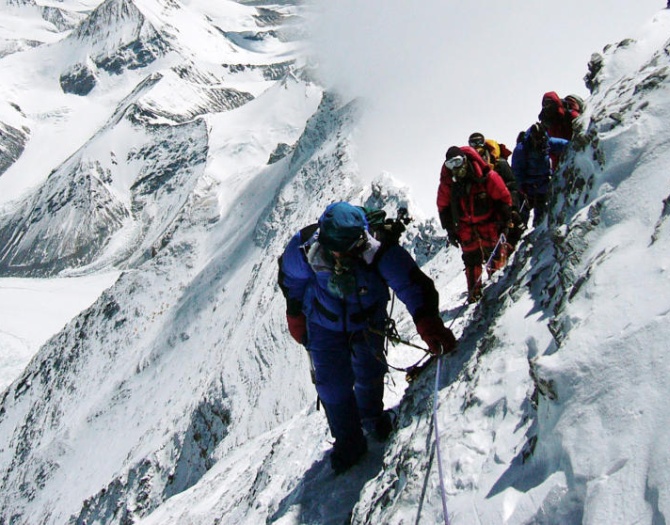Nepal has sharply increased permit fees for climbing Mount Everest by 36 per cent and also introduced a slew of measures aimed at controlling garbage pollution on the world's tallest peak, officials said.

Under the revised mountaineering regulations, the royalty fee for foreigners climbing Everest from the normal south route in the spring season (March-May) has been raised to $15,000 from the current $11,000 per person.
The autumn season (September-November) climbing fee has increased from $5,500 to $7,500.
At the same time, the permit cost per individual for the winter (December-February) and monsoon (June-August) seasons has risen from $2,750 to $3,750.
A Cabinet decision to this effect has already been made, though the official announcement is yet to come, said Arati Neupane, Director of the Tourism Board.
The new fees for climbing the 8848.86-metre peak will come into effect from September 1, 2025, she added.
The revised regulations, approved by the Cabinet will become effective once it is published in the Nepal Gazette.
However, the royalty for Nepali climbers wishing to climb Everest will be increased by double from current Rs 75,000 to Rs 150,000 for autumn, she said.
The last royalty fee revision was made on January 1, 2015, when the government switched from a group-based system to a uniform fee of $11,000 per climber for the spring season from the normal route.
Climbing permits, previously valid for 75 days, will now be limited to 55 days.
The reduced validity is aimed at streamlining climbing activities, the Kathmandu Post reported.
"Bookings already confirmed for the spring 2025 expedition will not be affected by this change," said Indu Ghimire, a joint secretary at the Tourism Ministry.
According to Ghimire, the regulations have focused on garbage management, social security for high-altitude workers, and boosting government revenue.
As per the amended rules, from the upcoming spring season, Everest climbers will be required to bring their poop back to base camp for proper disposal.
Climbers must carry biodegradable bags to collect waste in the upper reaches.
Base camps typically have designated toilet tents with barrels to collect human waste during expeditions. However, in higher camps, only a few agencies provide similar facilities, while others rely on pits.
Very few climbers use biodegradable bags to transport waste from the summit, the report added.
Last spring, the local government of Khumbu Pasang Lhamu Rural Municipality enforced the use of biodegradable waste bags as part of its initiative to address the garbage issue.
It sold 1,700 poop bags. This initiative has now been mandatory for climbers scaling peaks over 8,000 metres.
Mandatory waste collection is part of a broader effort to address environmental degradation in the Everest region.
Climbers have long relied on unsustainable practices, accumulating garbage, including discarded oxygen canisters, abandoned tents, food packaging, and human waste in one of the world's most iconic places.
Such practices have tarnished the region's natural beauty and created health hazards for local communities.
According to the new rules, climbers are barred from carrying items not listed in their permit documentation issued by the Department of Tourism.
During last year's spring climbing season, 421 permits were issued for fee-paying individuals.
Around 600 climbers, including 200 foreigners, reached the summit, with nearly 2,000 people assembling at the base camp.
Eight climbers lost their lives, and the expeditions generated an estimated 100 tonnes of waste, the report added.
-- By Shirish B Pradhan in Kathmandu











 © 2025
© 2025